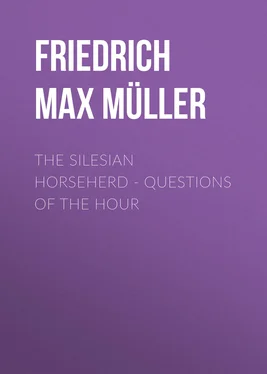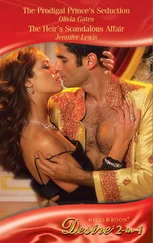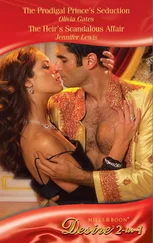Friedrich Max Müller - The Silesian Horseherd. Questions of the Hour
Здесь есть возможность читать онлайн «Friedrich Max Müller - The Silesian Horseherd. Questions of the Hour» — ознакомительный отрывок электронной книги совершенно бесплатно, а после прочтения отрывка купить полную версию. В некоторых случаях можно слушать аудио, скачать через торрент в формате fb2 и присутствует краткое содержание. Жанр: foreign_prose, foreign_religion, Философия, foreign_psychology, foreign_antique, на английском языке. Описание произведения, (предисловие) а так же отзывы посетителей доступны на портале библиотеки ЛибКат.
- Название:The Silesian Horseherd. Questions of the Hour
- Автор:
- Жанр:
- Год:неизвестен
- ISBN:нет данных
- Рейтинг книги:4 / 5. Голосов: 1
-
Избранное:Добавить в избранное
- Отзывы:
-
Ваша оценка:
- 80
- 1
- 2
- 3
- 4
- 5
The Silesian Horseherd. Questions of the Hour: краткое содержание, описание и аннотация
Предлагаем к чтению аннотацию, описание, краткое содержание или предисловие (зависит от того, что написал сам автор книги «The Silesian Horseherd. Questions of the Hour»). Если вы не нашли необходимую информацию о книге — напишите в комментариях, мы постараемся отыскать её.
The Silesian Horseherd. Questions of the Hour — читать онлайн ознакомительный отрывок
Ниже представлен текст книги, разбитый по страницам. Система сохранения места последней прочитанной страницы, позволяет с удобством читать онлайн бесплатно книгу «The Silesian Horseherd. Questions of the Hour», без необходимости каждый раз заново искать на чём Вы остановились. Поставьте закладку, и сможете в любой момент перейти на страницу, на которой закончили чтение.
Интервал:
Закладка:
“You ask me what this juggling means;
Take this short answer for your pains;
A game of chance from the eternal sea
By the same sea again will swallowed be.
“But there is nothing in this world so false as the statement that good can ever come out of lies. Nothing in the world is so wholesome as truth, and truth is under all circumstances lovable, beautiful, and holy. Let us kneel before the truth of nature; nature cannot go astray. The distinction between good and evil, the evil heritage of Judaism, must fall in the end. Max, on quiet fields, in a mountain village of Silesia, I turned somersaults with joy at the discovery that this distinction is false, and that good and evil are identical. Max, you will not be angry with me? I am no learned fellow. I never attended a high school, and now I rejoice at it, for what a German calls education can only serve to miseducate after all. Modern life is, for every open-minded person, the real high school. Max, all German savants, or, if you please, the majority of them, still labour under the delusion that the mind is a ‘prius.’ By no means, Max! Mind is a development, an evolving phenomenon. One would suppose it impossible that a thinking man, who has ever observed a child, could be of any other opinion; why seek ghosts behind matter? Mind is a function of living organisms, which belongs also to a goose and a chicken. Then, Max, why not be content with the limits of our knowledge, conditioned by experience, and give up this infamous romancing and tyrannical lying? The only affection which after fifty years I still cherish in my bosom is the sweet, unquenchable longing for that truth which fate has denied us.
“Max, you are by no means a free man, as I observe that the religious congress in Chicago impressed you very much. 35 35 Deutsche Rundschau , 1895, LXXXII, 409 ff., “The Parliament of Religions in Chicago,” by F. Max Müller.
I was present when the gayly dressed idolators from Cardinal Gibbons down to the stupid Shinto priest and the ill-favoured Baptist woman preacher sat together on the platform. It was very pretty and refreshing to look upon. They all talked nonsense and thought themselves very wise. There was but one exception which interested me: a yellow Buddhist monk inquired, what they thought of English missionaries, who in time of famine distributed bread to the poor, but only on one condition, that they adopted the Christian superstition (indifferent whether honestly or not). The so-called ‘Ethical Culture Societies’ were not admitted by the committee to their congress of many religions. Max, it was pitiful to listen to the tittle-tattle that was read. None had learned beforehand what he wanted to say. Dicere de scripto is a shame for learned men. Only Cardinal Gibbons made a short, but colourless and dull extemporaneous address, which closed with the hypocrisy, what a great thing it is to keep oneself unspotted by this world. Accursed hypocrites, you yourselves are this world,—pitifully incarnate, it is true,—but you yourselves are this ‘spotted world.’ Why then still hold to the stupid distinction between good and evil, when we must admit that evil is essential to the very existence of things, and it would be impossible for the world to be, except as it is. We must be as we are, or we should not be at all. O beautiful longing for the primeval cause! Our ignorance is like evil, welcome. Let us, O Max, embrace the evil and ignorance, for if we were nothing but wretched cripples of virtue, and knew everything, we could not bear to live. As it is, we enjoy the spirited battle, and carry a sweet yearning in our breasts.
“Max, how are you personally? Have you a family? How is your health? How old are you? What relation do you bear to the learned set in England? Do you know the one German philosopher, with the courage of his convictions, Emil Dühring, in Berlin. I consider my knowledge of the writings of Dr. Dühring as the greatest gift of fate which has been vouchsafed to me. The Jews and state professors hide his fame under a bushel. Oh! could not such independent men as you, honoured Max Müller, do something to bring this hero nearer to our young students? Dühring is the only writer of the present day who is to be enjoyed almost without drawback. What is to be said of our German set which is cowardly enough to repress so long the greatest mind which our century has produced? Were I in your position, how would I shout my ‘Quos Ego’ across to Germany! Please, my countryman, favour me with a few lines in answer to this effusion, in order that I may learn who and what you are. I am a Silesian horseherd (to be distinguished from the cowherds [ kühbürla's ], who till their field with pious moo-moos). Instead of attending a high school, I herded cows, ploughed, harvested, and helped to thrash in the winter. While herding I played the flute in the valleys of the Sudetic Mountains; and because the hands of the old village schoolmaster trembled very much, I begged of him to let me try to play the organ for him. ‘Ah, you rascal, you can play better than I,’ and he boxed my ears. Then my eldest brother took possession of the farm of seventy-five acres, gave us no compensation, and the rest of us lads had to pack off. We scraped together the passage money to America, and about thirty years ago I arrived here, where—I almost said God be praised—it has always gone pretty hard with me. Whether I fare well or ill is the same to me. I make no distinction, for in view of the rapid passing of life, it does not pay to give much thought to unnecessary distinctions. I never could think of marrying, chiefly because the majority of the women in this country are shrews, cannot cook, and spend much too much money on the housekeeping. Besides, I have but a short time to live, for I possess a chest catarrh most loyally devoted to me, verging upon a perfect asthma, which I hope erelong will bring me to a joyful end. No doubt you will think what a disconsolate fellow this is who has written to me. O pshaw! I have always enjoyed the sunshine, and have sat alone hundreds of snug hours before my winter's companion, a small iron stove. During the last three nights I have repeatedly read through your article on Celsus, published in the Deutsche Rundschau , by a tallow-candle. In relation to your enthusiasm over the religious clap-trap in Chicago, I should like to observe that you would have been entirely in the right if you had represented the Exhibition as the greatest event of the past ten years. I came through Chicago in September, 1892, visited the prospective site of the Exposition, and found there a mere wilderness, scarcely a single building half finished, and it was a wonder of wonders what American enterprise and genius for organisation accomplished within the single intervening winter. One could scarcely recover from one's astonishment at what ten thousand labourers, urged on by the Yankee lash, could make ready in six months. ‘There was money in the business,’ and for money Jonathan works real miracles. Its like the world has never produced. The American is cut on a large pattern, and in spite of his political delusions I entertain the greatest hopes for the future of a country which is in such hands.”
With many friendly greetings, A Silesian Horseherd. Emigrated to America.”I answered my unknown friend and correspondent as follows:—
“My Good Friend: You are an honest fellow, and I believe that I am one too, but our views are widely divergent. I am an old professor, am now seventy-two years old, or as has been often said to me, seventy-two years young. Like yourself I commenced life with nothing, and have laboured till I have become not rich, but independent. Here in wealthy England and in wealthy Oxford I am considered a poor man, but I am quite content, and call that riches. I have been married thirty-seven years, have one son, secretary to the Embassy at Constantinople, and a happily married daughter, with four grandchildren. Now you know all that you wished to know. Of my sorrow, the loss of two daughters, I must remain silent.
Читать дальшеИнтервал:
Закладка:
Похожие книги на «The Silesian Horseherd. Questions of the Hour»
Представляем Вашему вниманию похожие книги на «The Silesian Horseherd. Questions of the Hour» списком для выбора. Мы отобрали схожую по названию и смыслу литературу в надежде предоставить читателям больше вариантов отыскать новые, интересные, ещё непрочитанные произведения.
Обсуждение, отзывы о книге «The Silesian Horseherd. Questions of the Hour» и просто собственные мнения читателей. Оставьте ваши комментарии, напишите, что Вы думаете о произведении, его смысле или главных героях. Укажите что конкретно понравилось, а что нет, и почему Вы так считаете.












